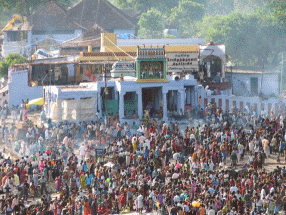| |
|
 |
The Hindu Newspaper features vital work on green pilgrimage by ARC's partner organisation in India
July 26 2017:
 |
 |
 |
"Sorimuthayan Temple enclave in the heart of the tiger reserve is unique because of its cultural importance, religious fervour and the magnitude of its human footprint on the ecosystem." |
The Hindu Newspaper today features a story of how Hindu pilgrimages in tiger reserves are now much greener and more considerate to the natural world, thanks in part to organisations such as ARC's India partner organisation Ashoka Trust for Research in Ecology and the Environment (ATREE) which has worked on green pilgrimage issues for some years.
TAMIL NADU: Setting the trend for green religious tourism. JULY 26, 2017
Pressure eased on flora and fauna at Aadi Amavasai festival at Sorimuthu Ayyanar TempleThe Aadi Amavasai festival passed off peacefully at the Sorimuthu Ayyanar Temple inside Kalakkad-Mundanthurai Tiger Reserve (KMTR), thanks to the meticulous measures taken by the official machinery.
For many years, the Department of Forest and non-governmental organisations such as ATREE (Ashoka Trust for Research in Ecology and Environment) have been working together towards greening the temple’s Aadi Amavasai festival. The shrine is situated deep inside the Kalakkad Mundanthurai Tiger Reserve. Nevertheless, the festival draws over a lakh devotees from various parts of Tamil Nadu, especially Tirunelveli and Thoothukudi districts, every year.
Until last year, hundreds of private vehicles carrying devotees would cause traffic snarls all along the narrow ghat road. What is more, the moving vehicles would kill reptiles inside the sanctuary. And tigers reeled under the immense pressure caused by the presence of humans.
 |
| "Until last year, hundreds of private vehicles carrying devotees would cause traffic snarls all along the narrow ghat road. What is more, the moving vehicles would kill reptiles inside the sanctuary. And tigers reeled under the immense pressure caused by the presence of humans." |
|
 |
 |
Fortunately, the much-desired breakthrough came this year, mainly because of the efforts of District Collector Sandeep Nanduri and Sub-Collector Cheranmahadevi Akash. The duo took a conscious decision to reduce the pressure of pilgrims on the forest and the wild animals, but without affecting the ‘festival fever’.
As part of the plan drawn by the Collector and the KMTR administration, the vehicles of pilgrims were stopped at Pothigaiyadi, the base of KMTR. From here, the devotees were taken to the temple in Tamil Nadu State Transport Corporation buses. Though a few splinter groups staged demonstrations against the move, the district administration and forest officials stood firm in their decision.
Subsequently, bus services from KMTR check post at Pothigaiyadi to the temple were increased manifold after vans, bikes and other private vehicles were stopped at the base itself. On their part, the police drew meticulous plans for creating an adequate parking bay. They also helped pilgrims shift their belongings from their vehicles to the buses under the watchful eyes of KMTR Field Director Venkatesh and Deputy Director Jayaraj.
The KMTR had deployed a good number of staff and volunteers to ensure that polythene, tobacco products, shampoo sachets, liquor and other banned articles were not taken inside the sanctuary.
“It was amazing to see the check posts free of clogging of vehicles during the festival this year, and the devotees handing over plastics and other banned products at the frisking points,” said Mathivanan, coordinator, ATREE.
After creating awareness in the villages that usually sent a few thousand devotees to the festival against bringing banned products to the temple, volunteers of ATREE and a few more NGOs worked round-the-clock at the temple site with sanitation workers from Manimutharu Town Panchayat and Vickramasingapuram municipality, who operated good number of garbage removal vehicles.
“The model that had been evolved for this temple festival inside KMTR should be replicated in other sanctuaries also,” said T. Ganesh of ATREE, who had camped at Mundanthuarai along with volunteers.
Plans are afoot to bring mobile toilets to the festival next year to improve sanitary conditions further.
LINKSThe Hindu Newspaper article in full
ATREE
Building Stewardship in the buffer zone to protect biodiversity - Clean KMTR Campaign
|
 |
 |
|
|
|
|
|
 |
Green pilgrimage network members
The vision is of pilgrims on all continents and the pilgrim cities that receive them, leaving a positive footprint on the Earth |
 |
Hindu ecology
An outilne of Hindu teachings on the environment |
 |
July 27, 2017:
First sacred cities investment meeting July 24-25
This week in London, representatives of faith-based sacred city proposals totaling nearly a billion dollars discussed how their initiatives could be funded through the investment community’s growing commitment to ethical or “impact” investment. |
 |
 |
|
|

